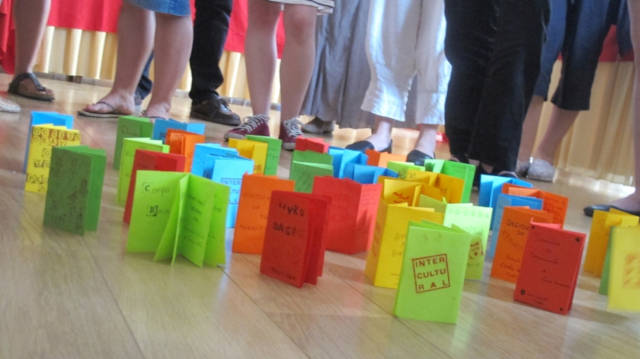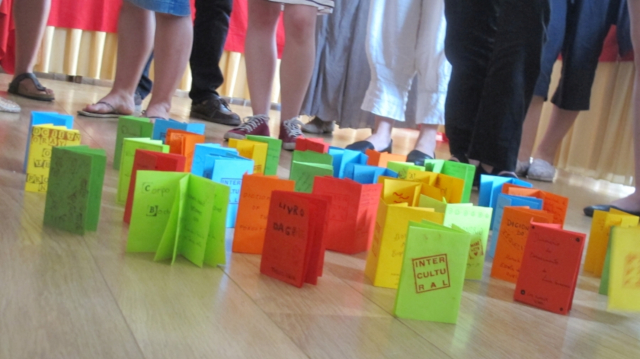CES Summer School
Epistemologies of the South VI: Existing, Resisting, and Fighting through the Arts
27, 28, 29, 30 June, 2022 & 04, 05, 06, 07 July, 2022
Online event
6th EDITION of the INTERNATIONAL SUMMER SCHOOL "EPISTEMOLOGIES OF THE SOUTH": EXISTING, RESISTING, AND FIGHTING THROUGH THE ARTS

Epistemologies of the South seek to broaden the possibilities of rethinking the world from the knowledges and practices of the Global South. As an epistemological and political proposal, they challenge attempts at epistemic silencing, epistemicide or epistemic subalternisation. The South, in this context, is heterogeneous and includes diverse spaces, varied experiences and an infinity of knowledges.
With this new edition of the School we seek, through the arts, to develop theoretical and methodological approaches that enable critical diagnoses of the present from an ecology of knowledges, having as a constitutive element the possibility of reconstructing, formulating and legitimating alternatives for fairer and freer societies.
Articulating art, science and the knowledges of resistance and struggles, the work will be collective and will bring together researchers from the Epistemologies of the South group, artists and intellectuals committed to Epistemologies of the South, as well as forty participants from various parts of the world and bearers of different knowledges.
As in previous editions, we expect a heterogeneous group in terms of origin, age, work experience and struggle. This summer school will be a space for exchange and co-learning to imagine drawing utopias from concrete experiences and knowledges.
Where, When and How?
- The course will take place on 27, 28, 29 and 30 June, and 04, 05, 06 and 07 July 2022, by e-learning, using the Zoom platform.
- Schedule: 14h00-19h30 (Portugal) || 15h00-20h30 (Spain/France/Italy) || 10h00-15h30 (Brazil) || 15h00-20h30 (Angola) || 15h00-20h30 (Mozambique)
- The total number of hours of the course is 44
- Certificate: of the 44 hours
- 40 students, with 4 scholarships
- The PROGRAMME will be available soon
Organization of the course
The course starts on 27 June with an inaugural lecture, followed by Q&A. Over the following six days two opening presentations will take place, featuring academics and artists. Each presentation will last 20-25 minutes, introducing themes and questions that will stimulate the discussions to be developed in the following workshops among the participants. Each day ends with a moment of debate between the students and the speakers. The use of audio-visual materials is recommended.
The course ends with a collective session (07 July) designed to foster collaborative reflection and the transfer of knowledge among all the participants.
An interdisciplinary programme
Relying on the strong international dimension of the Epistemologies of the South, this Summer School will be still organized on-line, due to COVID-19 restrictions. It will focus on "Existing, Resisting and Struggling through the Arts" and will run from June 27, 28, 29 and 30 through 04, 05, 06 and 07 of July 2022.The major themes, such as ecology of knowledges, colonialism, decolonization, the arts, mediations and supports (institutions, actors, material supports) or translation (transmission, adaptation, appropriation) will be addressed through the presentation of concrete examples.
Who is the course aimed at?
Students, teachers, social movement activists, and general public.
Working languages
The working languages will be Spanish and Portuguese, respecting the various existing versions, contributing to the intercultural transfer of knowledge and situated know-how.
Course objectives
The course is designed as an environment for the work and co-participatory construction of knowledges born from experiences, based on a pro-active and innovative pedagogical methodology. The course will function based on dynamic co-work in reflexive teams during the workshops, where students and lecturers share knowledge and dilemmas about the problems that mark the contemporary world. The horizon of decolonisation of knowledge is a central objective. in this sense, the main objective of this advanced training course is to promote South-South interdisciplinary dialogues to broaden reflection, show and make visible, record, interpret and extend the knowledge that sustains social struggles in our times.
The course is based on four fundamental axes based on the epistemologies of the South:
- That the understanding of the world far exceeds the European understanding of the world;
- That there cannot be global social justice without global cognitive justice;
- There is no lack of alternatives in the world, what is lacking is an alternative thinking of alternatives;
- The epistemologies of the South claim a diversity of knowledges that sustain social struggles that must be (re)known and valued. Consequently, as an alternative to any general theory, the Epistemologies of the South focus on the promotion of an ecology of knowledges together with intercultural translation.
APPLICATIONS
Applications are open to all those available to participate in a challenging space of mutual learnings towards the decolonisation of thought and struggle against capitalism, colonialism and patriarchy. A heterogeneous group is expected in terms of origin, knowledge, age and experience of work and struggles, composed of academics of different areas, artists and other professionals, students and activists. Involvement in social movements or other forms of activism or social struggle is highly valued.
We understand the course as a space for conviviality, well-being, the sharing of heterogeneous knowledges and mutual learnings among everyone. We recognise the centrality of the production of knowledge beyond the walls of the academy and seek for artistic production to challenge the political imagination.
We acknowledge the extraordinary differences that make up the world and are convinced that shared experiences of struggle allow the constitution of a diverse but united South with potential for resistance against colonialism, capitalism and patriarchy.
All those interested in participating in the Summer School must fill in the APPLICATION TO SUMMER SCHOOL FORM.
IMPORTANT:
- Applicants for this advanced training course must submit a biographical note (up to 300 words) and a motivation letter (up to 700 words) stating why they would like to attend the course, how the subject of the course dialogues with their interests and how it would enrich their knowledge, as well as describing how their participation could contribute to stimulating discussions and enriching the knowledge of the group. Pay attention to the number of words, as the form will only accept the number of words indicated!
- Applicants will receive a confirmation that their application has been received.
- The course is limited to 40 participants. Applicants will be notified of acceptance or non-acceptance by 20 April.
- 4 scholarships will be awarded to cover full participation in the course (tuition).
- Applicants for scholarships should select the "Scholarship Application" option on the form.
- Applications must be submitted [HERE] by midnight of March 31st.
The Summer School is self-funded and does not generate profit. Registration fees grant funding for 4 scholarships for participants.
REGISTRATION AND TUITION
|
Early Bird Fee Deadline for full payment of the registration fee: May 16 |
Students: 50€ Regular: 70€ |
|
Late Bird Fee Deadline for full payment of the registration fee: June 06 |
Students: 80€ Regular: 100€ |
The deadline for full payment of the registration fee is May 16 (early-bird fee) and June 6 (late-bird fee). In case of withdrawal, the registration fee will be refunded when notice of withdrawal is given at least 20 days before the course starts. Any cancellations after June 6 will not be subject to any refund.
Notification of acceptance will be accompanied by guidelines for the participant regarding how to proceed with the registration and payment.
For any queries relating to these matters, please contact the organising committee at alicesummerschool@ces.uc.pt.
ORGANISING COMMITTEE
- Boaventura de Sousa Santos
- Maria Paula Meneses
- Patrícia Branco
- Marisa Ramos Gonçalves
- Fabián Cevallos Vivar
- Iolanda Vasile
- Bryan Vargas Reyes
FAQ
1. Who can participate?
Applications are open to all those available to participate in a challenging space of mutual learnings towards the decolonisation of thought and struggle against capitalism, colonialism and patriarchy. A heterogeneous group is expected in terms of origin, knowledge, age and experience of work and struggles, composed of academics of different areas, artists and other professionals, students and activists. Involvement in social movements or other forms of activism or social struggle is highly valued.
2. What are the working languages at the Summer School?
Portuguese and Spanish. The working groups call for shared co-responsibility of the participants so that intercultural translation can occur.
3. Will I have access to the Summer School’s Reading materials before the beginning of the course?
Yes. You will have access to the materials online two weeks prior to the beginning of Summer School, at the least.
4.When and Where will the Summer School be held?
The Summer School will be held between June 27 and July 8, 2022, by e-learning through the Zoom platform.
5. Will I be entitled to a certificate of participation?
Yes. All participants will receive a certificate of participation.
6. Until when can I apply and what is the deadline for payment?
Applications run until March 31st. The deadline for payment is May 16th (early-bird fee) or June 6th (late-bird fee with increased costs).
7. Will I receive a confirmation when registration and payment is completed?
Yes. You will receive a confirmation the moment you register, including details for making a payment. As soon as you complete the fee payment you will receive a transaction confirmation.
8. Where does tution go to?
Registration fees grant funding for 4 scholarships for participants.
|
|


